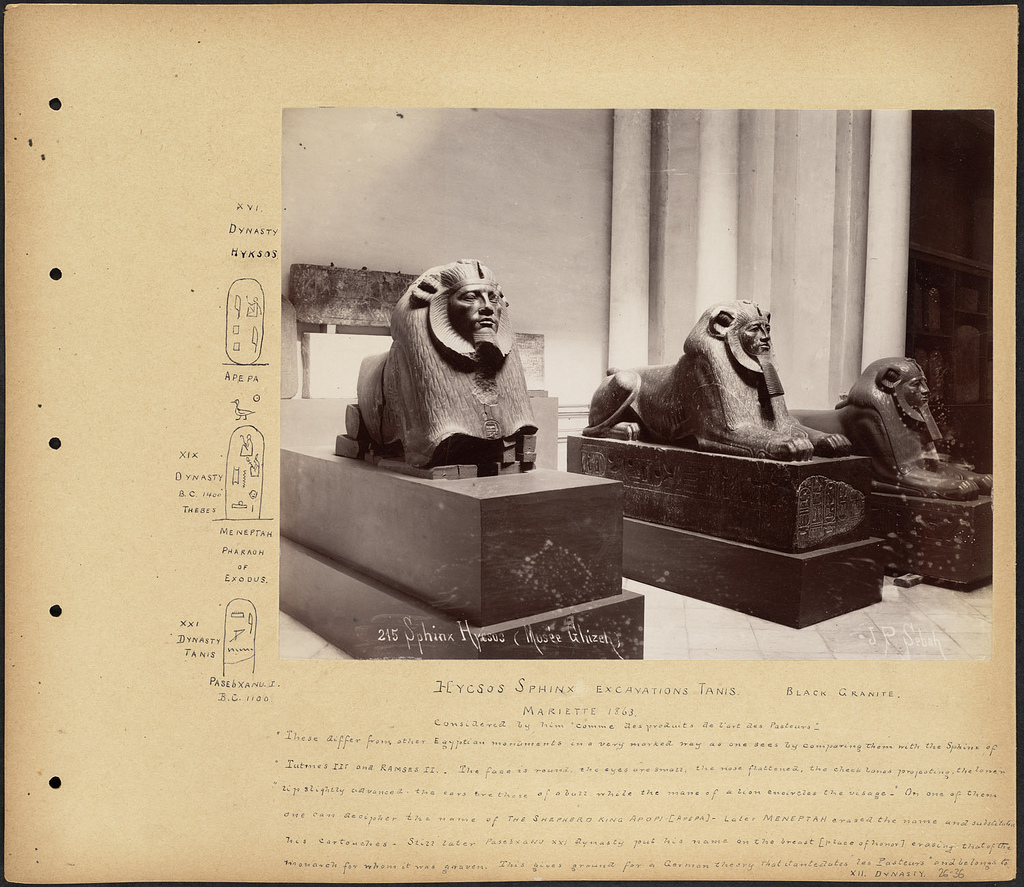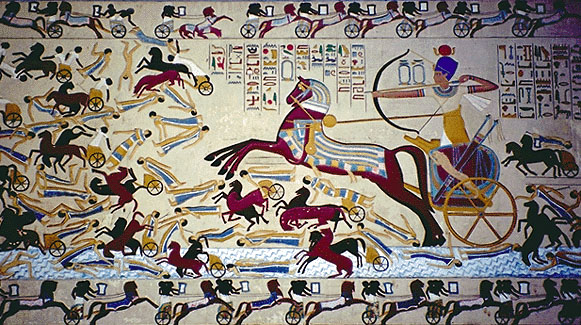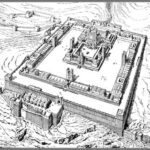When Yosef requested that Pharaoh’s Royal Cupbearer “recall that I was with you when things go well for you, do me a favor, remember me to Pharaoh, and effect my release from this institution,” what did Yosef hope to accomplish?
Reminding the King of Egypt about Yosef implies prior acquaintance, else why would Yosef expect the Royal Cupbearer’s mission to gain his release to succeed? Since Yosef and Pharaoh never saw each other, what recognition was he signaling?
Furthermore, Yosef was a slave, imprisoned by his master on suspicion of having committed a love crime. Although falsely accused, it is illogical to believe that a slave will be believed over the master.
And more, why would Yosef accentuate the fact that he had been “kidnapped from the Land of the Hebrews”? Would Pharaoh then free all slaves who got that way by being kidnapped? In those days, the law recognized kidnapping and slave trade. Even today, kidnapping and slavery are practiced and condoned in Africa and Asia (and at least practiced, if not openly condoned, throughout the West). Back then, in ancient Egypt, how could Yosef hope to be granted amnesty and emancipation?
Also, we find that once Yosef came to power over Egypt, he instituted a harsh policy of forced population transfers and what some called coercive circumcision mandates.
All this indicates that the Egyptian nation suffered greatly under Yosef’s administration. Welfare benefits, including food stamps, were only available to circumcised green pass holders. The entire program was, of course, voluntary. Egyptians did not have to submit to the procedure if they did not want to; but they would unfortunately be starved to death if they did not. It was up to them.
When the Egyptians submitted a complaint directly to Pharaoh, they were curtly rebuffed: “Go to Yosef. Do whatever he tells you.” Investigating what Pharaoh knew and when he knew it reveals that the King of Egypt never attempted to interfere with, or even criticize, Yosef’s brutal policies.
And regarding what is later written that “there arose in Egypt a new king who did not know of Yosef”: How is it possible not to know of the wise Yosef who ruled the entire land of Egypt for eighty years, a tenure of unprecedented duration, and who saved Egypt and the entire known world from perishing of starvation?
We also find that when Israel left Egypt, they were accompanied by a great mixed multitude, outnumbering the Children of Israel by many hundreds of thousands. This populace was enslaved and suffered in Egypt, just like Israel. How did these people come to be ensnared in Egyptian servitude? And from where did such a great human wave arrive?
It is known that the decree told to Avraham, “Your descendants will be foreigners in a land that is not theirs for 400 years. They will be enslaved and oppressed,” referred specifically to the Jews. This did not apply to the mixed multitude. Why, then, did the Egyptians subject also them to harsh servitude?
Rather, in the days of the Forefathers, and especially in the time of Ya’akov Avinu, a group of foreign rulers known as the Hyksos invaded and controlled large parts of Egypt for hundreds of years. The Torah’s account of Yosef in Egypt takes place during what is called by archeologists the “Second Intermediate Period,” which coincides with Hyksos rule.

A coalition of Semitic-speaking peoples from Western Asia, they were not a single, unified people, but rather a collection of tribes or clans. After establishing their capital at Avaris in the Nile Delta, their rule eventually expanded southward.
They introduced new technologies and warfare tactics to Egypt, including the composite bow and horse-drawn chariots that figure centrally in the Exodus. And while they adopted many Egyptian customs, they also maintained their own cultural practices, most significantly, that of shepherding.
The Hyksos rule was eventually ended by a series of Egyptian rulers, most notably Ahmose I. Much of what we know about the Hyksos comes from Egyptian sources, which often portray them negatively.
According to Rav Nisim HaLevy in his Chikrei HaKadmonim, all the Arabic peoples at the time were shepherds, and it was they, called “Shepherd Kings,” who ruled Egypt during Yosef’s time.
Pharaoh, King of Egypt during the time of Yosef was not an ethnic, Hamitic Egyptian, but rather was one of the Shepherd Kings from the Ishmaelite, Arab nations. Distant members of Avraham’s family, they were all shepherds. It was these children of Ishmael and children of Keturah who conquered Egypt and ruled her by force, quite against the will of the hapless, indigenous Egyptians.
It was these kings who opened the doors to a flow of unrestricted immigration from lands hostile to the Egyptians but friendly to the ruling regime. Received as brothers by the ruling class, these Arabian migrants were swiftly appointed judges, ministers, officials, and army officers, as their loyalty to the regime was beyond question.
To the Egyptians, this foreign element was like thorns in their eyes. They hated the king and his cadre but were powerless to depose them.
Thus, when Yosef asked the Royal Cupbearer to remember him to Pharaoh because he had been kidnapped from the Land of the Hebrews, he was communicating that he was a Jew, hoping that the king would recognize Yosef as family and grant him amnesty.
And indeed, when Pharaoh heard of Yosef, he immediately sent for him. Upon seeing evidence of Yosef’s wisdom and competence, the king disregarded Egyptian law and protocol prohibiting slaves serving in positions of authority and wearing more prestigious clothes than those warranted by their caste. Happy to find a loyal family member who was competent to pacify the enemy indigenous Egyptians, Pharaoh illegally appointed Yosef Egyptian dictator, granting him sweeping totalitarian powers.
Indigenous Egyptians therefore abominated shepherds, to the extent that they would not break bread with them, since their Ishmaelite king and his entire cabinet who ruled them without their consent were all from the hated shepherd class.
When Pharaoh eventually heard that Yosef’s brothers had arrived, he rejoiced at the prospect of absorbing more loyalist migrants, and asked that their entire family, along with their father, Ya’akov, be brought to Egypt, furnishing them with the most advanced means of transportation available.
Thus, once the family arrived, Yosef instructed them to highlight their status as shepherds to Pharaoh. Although the Shepherd Kings had invaded and stolen Egypt, rendering shepherds persona non grata among indigenous Egyptians, they were sought after by the ruling clique for leadership positions.
Pharaoh had even intended to form a regiment of Hebrew warriors, officered by Yosef’s brothers, as well as placing them in charge of all royal flocks, offers they declined.
Yosef’s Egypt policies are thus understood on this background. The forced population transfers were deliberately conceived to weaken and demoralize the ethnic Egyptians, as were the forced circumcision mandates. Pharaoh did not object because, as an Ishmaelite, he himself was circumcised.
The Egyptians were unable to revolt and finally throw off the yoke of the Shepherd Kings until Yosef and all of his brothers had passed away. When they did, after a bloody civil war, a new king was installed “who did not know Yosef.”
The new king, who had headed the rebellion, was a blue-blooded Hamite Egyptian. A priority of his administration was to subjugate and exact vengeance upon all irredentist elements, starting with Yosef’s family and including all the Arabian nations descending from Ishmael and from Keturah and from Midian who comprised the mixed multitude.
This new Pharaoh therefore addressed his people: “We must deal wisely with them, lest they increase and join our enemies in the event of a war, driving us from the land.” Their solution was to “build fortified cities for Pharaoh,” which were storage cities that were fortified and converted into concentration camps for the resettlement of all the migrants who arrived during the Shepherd King’s era.
The Pitom and Ra’amses forced labor camps were punishing and pitiless, and were designed with the purpose of avenging past injustices in mind. Children were routinely drowned in Egypt’s River Nile to weaken and demoralize what was left of their spirit, until the Creator revealed His compassion on them, saw their suffering, and sent them His chosen servant Moshe to redeem them amid signs and wonders. For the sake of saving Israel, the mixed multitude, who suffered Egyptian servitude alongside the Children of Israel, were also liberated.
Adapted from the Shmeina Lachmo, as told by the Ahavas Chaim







Fascinating. Thank you for sharing.